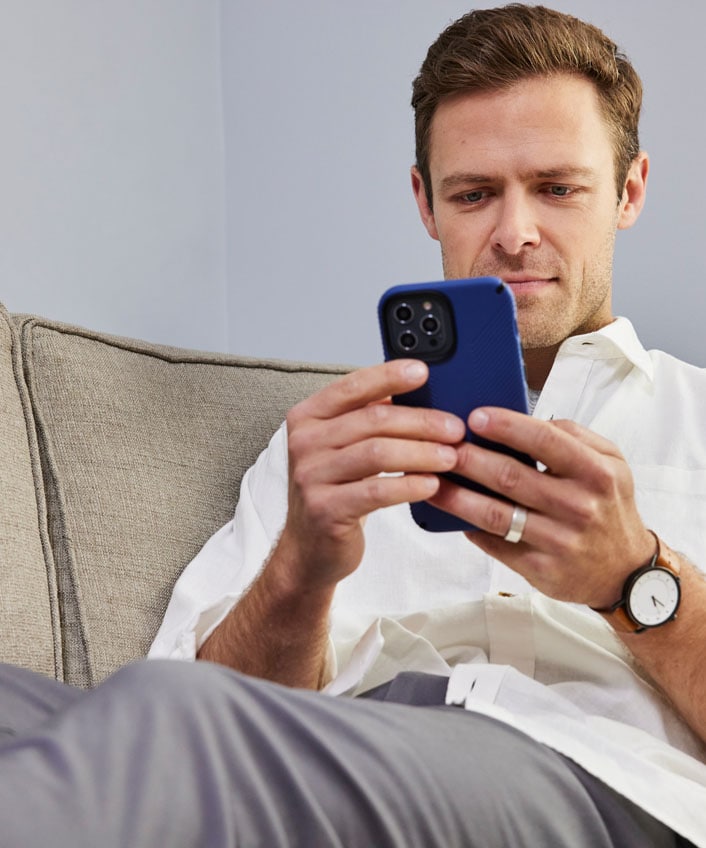Here's the reason why people cover their webcam
Can cybercriminals spy on you through your webcam? Here’s why you should cover it up.

You don’t have to look far to find a webcam. They’re on your laptop, tablet, and smartphone. It’s great to be able to chat with friends or family and see their faces, but webcams also pose a danger to your privacy and security.
A cybercriminal could potentially gain access to your webcam to record sights and sounds related to you. You might think you’d recognise if someone did that with your device, but there are ways a hacker can disable the LED light that normally signals your webcam is in use, even when it’s running.
Many people cover up their webcam because you never know who could be on the other end watching. If a snoop gains access to your webcam, they might gather footage to extort, blackmail, or cause mayhem in your life.
The good news? It’s an easy cyberthreat to protect against if you know what you’re doing. Here’s a look at why you should cover up your webcam, what might happen if you don’t, and six tips you can use to improve your webcam security.
Why you should cover up your webcam
Cyberthieves seek ways to target and steal information. This might take the form of hijacking online bank accounts, stealing financial data used for online shopping, or cracking into social media accounts.
But you may have noticed a piece of tape over a co-worker’s or a friend’s webcam lately. That’s because cyberthreats can target webcams, too.
The same viruses and malware that can steal information from your devices can also embed software that can record whatever a webcam sees. This might be activity that takes place in the comfort of your home or in the privacy of your workplace. If used for malicious purposes, a webcam could record sensitive moments or material, with the infected laptop sending the recordings back to the cybercriminal.
The material that’s collected can be used for a range of purposes, like blackmail, identity theft or to cause a victim distress. The cyberthreat of an exposed webcam can have a very real-life impact on whoever it affects.
What could happen if your webcam is vulnerable
If you don’t take precautions to secure your webcam, your privacy and online security might not be as strong as it could be.
There are two types of common webcams, each having different vulnerabilities that cybercriminals could exploit:
- Wireless webcams: These cameras use wireless connectivity to connect to your laptop or computer, but that also means they have an IP address and a password. Often, when the consumer purchases and sets up the webcam, they leave the password as the default option, instead of setting up a unique complex password of their own. That means anyone who is able to find the IP address might easily guess the password and be able to access the device.
- Built-in webcams: These cameras are built into your laptop or tablet and are handy for video conversations. But if your device gets a virus or malware, cybercriminals could then easily take over the webcam functionality and turn it on or off as they wish, as well as disable the LED light to avoid detection.
A smartphone’s front-facing webcam typically isn’t considered a security risk. That’s because when you’re not using it, it’s usually tucked away in your purse or pocket.
Not so with wireless or built-in webcams. Cybercriminals can access these cameras, and because of their positions — facing your living room, kitchen, or office — they can expose your privacy and sensitive conversations.
That’s why it’s a good idea to cover up your webcam or take other steps to improve your internet security.
6 tips to improve webcam privacy and security
Covering your webcam is an easy trick to avoid someone spying on you. But it doesn’t totally address the need for internet security. Plus, putting tape over your webcam doesn’t mean someone can’t still listen in through the microphone.
Here are six tips you can use to help improve your webcam and device security.
- Get antivirus software. Built-in webcams can be hacked with common viruses and malware. Antivirus software can help you better protect your device against these cyberthreats. Some security software prevents applications and malware from accessing your computer's webcam without your consent.
- Make sure your firewall is running. Firewalls act as a gate ensuring only legitimate traffic makes it to your network and your built-in webcam.
- Change the password on your wireless webcam. Thousands of wireless webcams are out there with the same default password that was coded into them by their manufacturer. If you update the default password to something unique and complex, you can help improve the security of your webcam.
- Update your operating systems and software. Cybercriminals can compromise devices and download viruses onto them by exploiting vulnerabilities found in the operating system or popular software. Be sure you update to the latest versions to patch security flaws.
- Avoid suspicious links or attachments. Cybercriminals sometimes use phishing emails to deliver a webcam virus or malware. Only open emails and links or download attachments from email addresses you trust.
- Use a sliding webcam cover. It’s a simple solution – slide the cover when you want to talk face-to-face with someone and close it when you’re not using it.
Follow these tips and you’ll be on your way to living a more private connected life.

Try Norton 360 FREE 7-Day Trial* - Includes Norton VPN
7 days of FREE* comprehensive antivirus, device security and online privacy with Norton VPN.
Join today. Cancel anytime.
*Terms Apply
Editorial note: Our articles provide educational information for you. Our offerings may not cover or protect against every type of crime, fraud, or threat we write about. Our goal is to increase awareness about Cyber Safety. Please review complete Terms during enrollment or setup. Remember that no one can prevent all identity theft or cybercrime, and that LifeLock does not monitor all transactions at all businesses. The Norton and LifeLock brands are part of Gen Digital Inc.





Want more?
Follow us for all the latest news, tips, and updates.